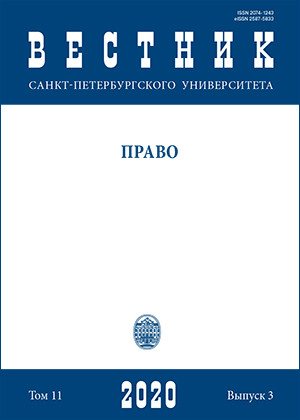Robotization: Dynamics of legal regulation
DOI:
https://doi.org/10.21638/spbu14.2020.301Abstract
The article analyzes the legal basis of robotization. The regulation features in this area are formulated due to the complex nature of the relationship. The legal problems of robotization in various areas of public life are given consideration: economics, labor relations, industry, and transport. The authors investigate the legal nature of managing state affairs in connection with the robotization process. Achieving high goals requires systematic consistent activity in all sectors of the economy and social sphere. This involves, firstly, general regulators, and secondly, the development of robotization in individual industries and fields, at enterprises and companies on a territorial scale. In particular, such is the experience of larger enterprises and here local regulators are necessary. It is proposed to formulate a system of legal support for robotization. The variation of robotization and its legal support is substantiated. In this regard, the role of methodological recommendations of the federal authorities should be combined with the updating and streamlining of departmental regulatory and technical documentation in electronic form. The problem of regulatory risks is becoming more relevant and the authors distinguish three types of possible risks in the field of robotization: traditional legal risks (violation of the legal system, criteria for choosing a legal personality, the absence of forecasting consequences and the presence of conflicts, etc.); risks as a result of flaws in the interaction of man and robot (unclear decision-making modes, poor “embeddedness” regarding dialogue modes in the control mechanism, underestimation of functional modes, etc.); risks of a program- technical nature, when errors in programs and the use of robots require their warning due to the clear regulation of objects of activity. The conclusions reached by the authors are that the robotic processes are planned and phased in the context of managing the public process; different branches of law are designed to ensure the functioning of robots; it is necessary to investigate the consequences of robotization for a “legal person”, its self-development, as well as new areas of the influence of law in place of the former.
Keywords:
robotization, legal regulation, dynamics, risks, regulation, digitalization, forecasting
Downloads
References
Downloads
Published
How to Cite
Issue
Section
License
Articles of "Vestnik of Saint Petersburg University. Law" are open access distributed under the terms of the License Agreement with Saint Petersburg State University, which permits to the authors unrestricted distribution and self-archiving free of charge.






